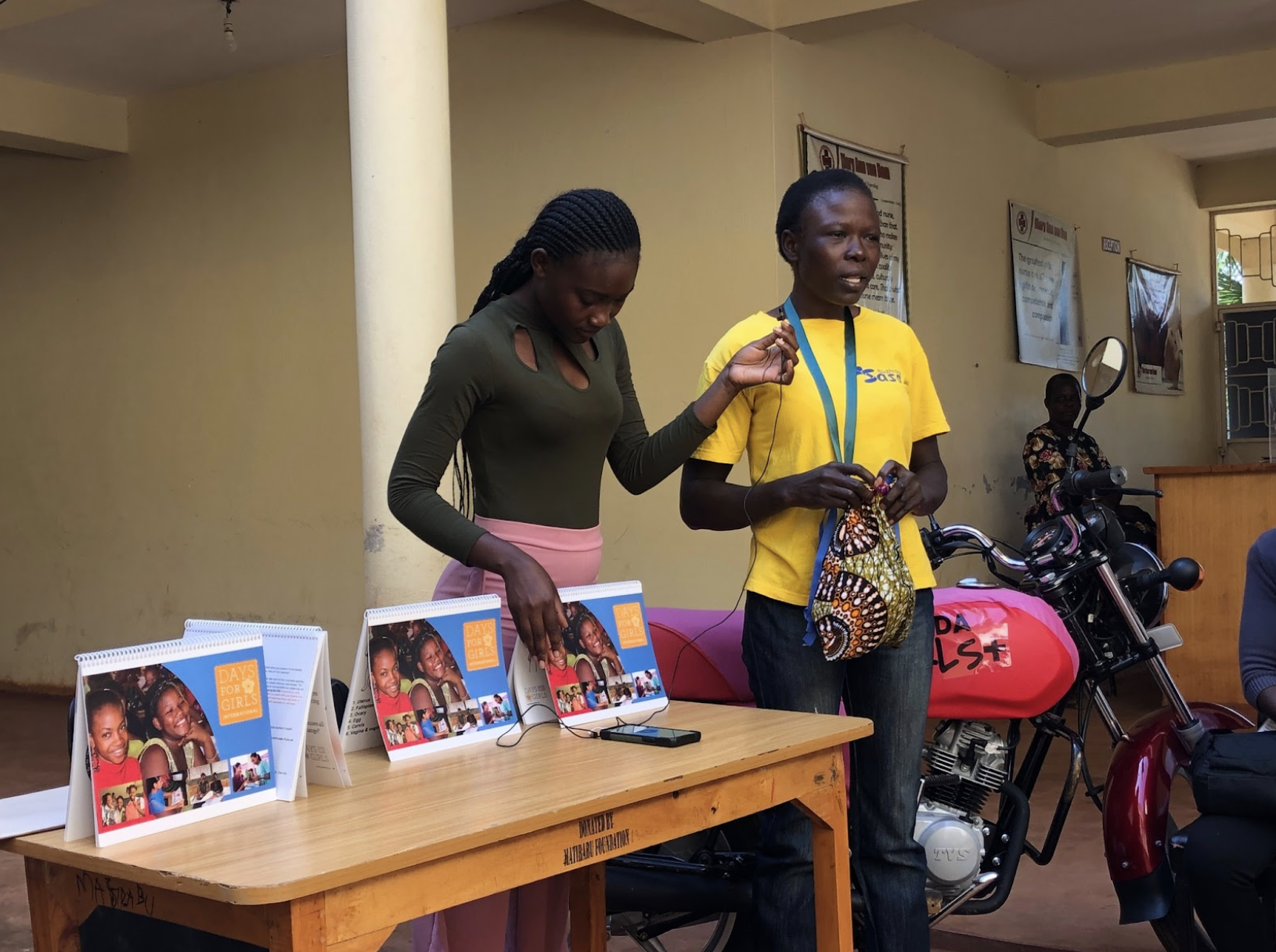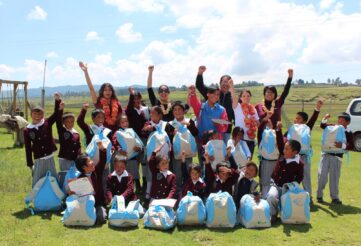The Boda Project in Rural Kenya
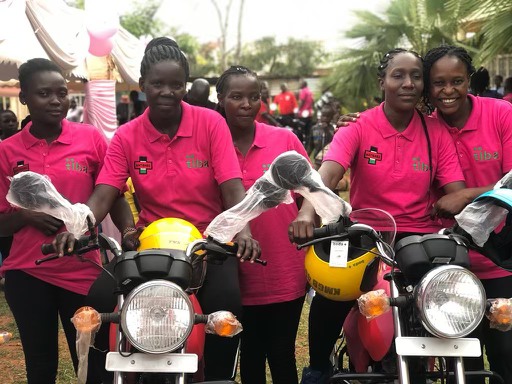
Inadequate menstrual health (MH) excludes a large number of women and girls in Kenya from equitable health, education and economic outcomes – let alone positions of influence and leadership. Sixty-five percent of women and girls cannot afford any brand of disposable sanitary pad on a monthly basis. As a result, many are coerced to engage in transactional sex to obtain pads, with 66% of pad users in one rural western Kenya study reporting that they received pads from sexual partners.*
One of the crucial windows where these coercive, predatory relationships develop is the daily journey that girl students make between home and school, initiated by male boda boda (motorcycle taxi) drivers. The drivers often provide girls with free transportation and other needed items, including period products, in exchange for sex. This dynamic places women and girls at risk for early/unwanted pregnancy, sexually transmitted infections, and inter-partner violence.
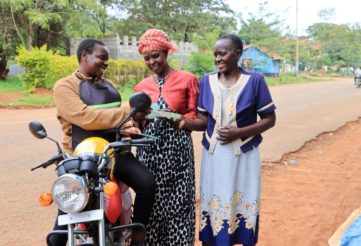 Students also have limited access to comprehensive and accurate MH education, with over 50% of women and girls interviewed for a Ministry of Health situation analysis reporting that they believe menstrual blood contains harmful substances. A lack of access to MH education in communities greatly influences the type and degree of menstrual stigma experienced by women and girls – stigma which limits freedoms including food restrictions, interaction with others, mobility and ability to excel in school and work. Supportive environments surrounding MH is a critical component of promoting gender equity and economic empowerment, ensuring women and girls can pursue opportunities and reach their full potential.
Students also have limited access to comprehensive and accurate MH education, with over 50% of women and girls interviewed for a Ministry of Health situation analysis reporting that they believe menstrual blood contains harmful substances. A lack of access to MH education in communities greatly influences the type and degree of menstrual stigma experienced by women and girls – stigma which limits freedoms including food restrictions, interaction with others, mobility and ability to excel in school and work. Supportive environments surrounding MH is a critical component of promoting gender equity and economic empowerment, ensuring women and girls can pursue opportunities and reach their full potential.
Our Response
To address this need, Days for Girls (DfG) partnered with two organizations operating in Siaya County, Kenya including Matibabu (a local private hospital) and their long term partner Tiba Foundation (an NGO focused on rural health and women’s empowerment). Together, we are implementing the Boda Girls project. Boda Girls (loosely translated as Motorbike Girls in English) is designed to equip marginalized young women, and empower them to support the health and wellbeing of other women and girls in their communities while making a living and growing professionally. The project identifies young women who have been forced to drop out of school (as a result of teenage pregnancy and/or financial constraints) and trains them to become independent business owners with a social mission – an ultimate representation of freedom and self-determination. Boda Girls receive training (most of which is designed and taught by the Tiba Foundation and Matibabu Hospital) to become:
- Licensed motorcycle drivers
- Community First Responders (First Aid)
- Certified Community Health Workers (CHWs)
- Days for Girls certified menstrual health educators
- Street Business School graduates equipped with skills in entrepreneurship
- Financial and computer literacy, passenger safety, self defense, business ownership, and Boda Girl mentorship
As part of their motorcycle transportation business, Boda Girls will act to improve the status of women and girls in their communities. Specifically, they will be empowered to:
- Increase access to school. Boda Girls offer free transport to school going girls, improving daily attendance and providing girls with a safe alternative to engaging with coercive or predatory male boda drivers. Providing this type of support in primary and secondary schools increases the likelihood that girls will continue on to secondary, college, and/or vocational training programs. To address root causes, Tiba will also include a cohort of male boda drivers from the community in their programming, offering them the opportunity to get certified through Matibabu Hospital as first responders who can serve in emergencies. These men will be trained in the DfG Men Who Know curriculum, which includes a module on the importance of male allyship for gender equity.
- Increase access to menstrual products. Boda Girls deliver DfG washable menstrual pad Kits to students across Siaya County, in partnership with local schools. The Kits are produced by the local DfG Hearts for Kenya Enterprise in Homa Bay County. Because many students in the community are low income and cannot afford to purchase menstrual products directly, Kits to date have been sponsored by our amazing DfG Southwest Boise Chapter volunteers, as well as the Spark Challenge Non-Profit Grant Prize from Micron Women’s Leadership Network Employee Resource Group. The Boda Girls have a goal to reach all girls in Grade 8, and hope to expand to include girls in other grades as well.
- Increase access to information. Boda girls are equipped as certified DfG educators, becoming experts in our holistic MH curriculum. They act as trusted resources that deliver accurate, timely, and age and culturally appropriate information about menstruation and sexual and reproductive health to community members and students, alongside DfG kits. Our learner-centered education is designed to increase knowledge, confidence and positive attitudes towards menstruation among participants.
- Increase access to healthcare support and family planning. This is done by providing free transportation to women and girls to-and-from clinics. Providing transportation removes a key barrier to accessing care, so women and girls are supported to utilize family planning, antenatal and maternal health services when needed.
- Develop a sisterhood of safety and opportunity. As a network of trusted transportation providers and resources for sexual and reproductive health information, Boda Girls within a community form a supportive and nurturing environment for girls and women to grow their self-agency, skills and to realize their dreams.
- Act as role models. In completing this program, Boda Girls become highly skilled in areas of both economic and health impact, representing possibilities to their peers.
- Contribute to data collection, which will support DfG and partners to develop insights about the impact of DfG education and products in the lives of students.
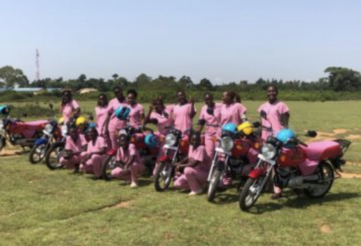
Join the Cause
Would you like to empower the Boda Girls as they expand access to safe transportation, health services, menstrual products, and information? Click one of the links below to get started.
Support Boda Girl Project trainings
Sponsor DfG Kits for students
All photos courtesy of the Tiba Foundation
* Phillips-Howard PA, Otieno G, Burmen B, Otieno F, Odongo F, Odour C, Nyothach E, Amek N, Zielinski-Gutierrez E, Odhiambo F, Zeh C, Kwaro D, Mills LA, Laserson KF. Menstrual Needs and Associations with Sexual and Reproductive Risks in Rural Kenyan Females: A Cross-Sectional Behavioral Survey Linked with HIV Prevalence. J Womens Health (Larchmt). 2015 Oct;24(10):801-11. doi: 10.1089/jwh.2014.5031. Epub 2015 Aug 21. PMID: 26296186; PMCID: PMC4624246.







